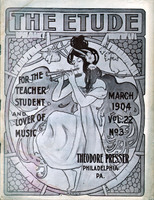BY WILLIAM C. WRIGHT.
The practice of each hand separately is commended by the best authorities. It is especially necessary for beginners; for it is easier to "break in" one hand at a time than both. But which hand shall be trained first in the order of practice? The present writer would say the left. In all single-hand practice of exercises, studies, and pieces get the left-hand part well under way before using the right. Why?
The left hand is generally neglected. Either because its music may seem less interesting, or because the left hand is, in the majority of cases, more awkward and intractable than the right; the bass is somewhat disfavored or even dreaded, and its work postponed and but partially done. Here is one reason, then, for taking up the left-hand work first; get the dullest, heaviest part mastered while the mind is fresh and buoyant, and attack the treble later.
The left-hand part, in the majority of compositions, is given notes that control the tempo, and most naturally mark and measure the rhythm. Upon the steadiness and certainty with which the bass is played greatly depends the successful performance of the treble. Many a snarl and snag in the right-hand work is owing merely to the imperfect way in which the left-hand part is played, plain and easy as it may seem to be.
The bass is fundamental; the ground from which spring the melodies and chords of the treble. The foundation should be perfect. Not a note should be allowed to be false or imperfectly sounded. The richness of tone produced by the best performers is greatly owing to the careful and thorough manner in which the left-hand part is played; while, on the other hand, the dry and meager results of much amateur playing are due to their shoddy bass.
More might be said, far more, to accentuate the importance of a first attention to the work of the left hand in playing the piano; and while it may be true that the first attention may be in estimate rather than in order of time, yet it may well be noted that what may be done at any time is seldom thoroughly done at all; that method and order are the life of study, and that the "time when" is an essential element of every program of practice or performance.



